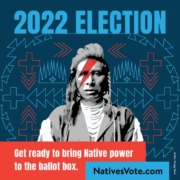Groups document voting rights abuses in Indian Country
From Salt Lake City Tribune:
Flagstaff, Ariz. • Election sites far from reservations. Poll workers who don’t speak tribal languages. Unequal access to early voting sites.
Native Americans say they’ve encountered a wide range of obstacles that makes voting difficult. Advocates have been spending the last few months gathering stories from around Indian Country in hopes that tribal members can wield more influence in elections, and improve conditions among populations that encounter huge disparities in health, education and economics.
“Some of the problems they were facing actually were issues we thought we’d taken care of long ago,” said OJ Semans, a Rosebud Sioux tribal member and executive director of Four Directions. “If you don’t keep your eye open and the communication open, things will reverse.”
Tribes successfully have challenged what they see as discriminatory voting practices around the United States. In Utah, a federal judge recently ordered school board and county commission districts redrawn after the Navajo Nation argued they were racially gerrymandered. In Nevada, the Pyramid Lake and Walker River Paiute tribes won a legal battle to improve early voting access on their reservations. Alaska Natives reached a settlement in a case that includes increased language assistance for three census areas.
Tribes often turn to the 1965 Voting Rights Act to try and force changes when working with local elections administrators doesn’t work, said James Tucker, a pro-bono attorney for the Native American Rights Fund. The group is part of a coalition holding field hearings across the country ahead of the next round of redistricting and to compile what it believes will be the most comprehensive look at voting rights abuses in Indian Country.
To read the full article visit sltrib.com



Leave a Reply
Want to join the discussion?Feel free to contribute!